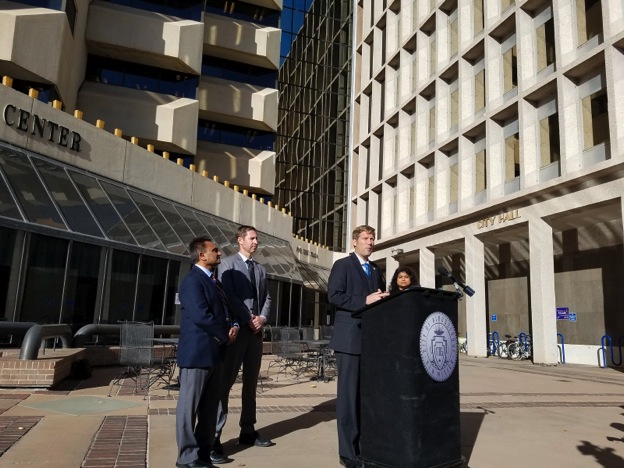Albuquerque’s newly elected mayor Tim Keller took the oath of office Dec. 1st, inheriting a police reform process that has dogged city leaders since 2014.

(Dani Prokop / NM News Port)
Among Keller’s first acts was naming a new interim chief of the Albuquerque Police Department to replace Gordon Eden. Eden announced his retirement to coincide with the arrival of Keller’s administration.
Keller’s pick to “evaluate, restructure, and turn-around” the department is former Rio Rancho Police Chief Michael Geier who has over 40 years of law enforcement experience.
Additionally at the announcement, Keller named to the police leadership team: APD Area Commander Roger Banez, Laguna Chief of Police Harold John Medina, and one holdover from the current administration, Deputy Chief Eric Garcia.
“I want to be really clear, this is in no way an interim keep-the-lights-on team,” Keller said to reporters. “This is a turnaround team, and that’s what they’re going to do for Albuquerque.”
Keller told New Mexico News port he wanted to emphasize his new team’s record in community policing and victim advocacy.
“That’s the reason why I think they’d be perfect for the job,” Keller said.
Keller steps into a contentious police reform process guided by a court-monitored agreement between the federal Department of Justice and the city of Albuquerque.
Keller said the new team has clear instructions to restart and accelerate the DOJ process.
“So they’re all very committed to that,” Keller said.
APD Reform Timeline
The U.S. Department of Justice opened an investigation into the Albuquerque Police Department in November of 2012, because the police force had a higher rate of fatal police shootings than Chicago or New York. The DOJ found the APD displayed a pattern of excessive force. The findings were released in the turbulent spring of 2014, where just a month before, weeklong protests erupted over the APD shooting and killing of a homeless man, James Boyd.
In October 2017, the city and the federal government agreed to a structured reform effort, referred to as the Court Appointed Settlement Agreement (CASA). At that time, an independent monitor was jointly selected by the parties.
[LINK: APD REFORM TIMELINE]
Dr. James Ginger was qualified by the DOJ as “a nationally recognized expert on police reform and organizational change.” Ginger and his company — Public Management Resources Inc.– must gauge compliance, guide the parties to meeting compliance, and provide technical guidance to APD. Ginger is prohibited by the CASA from making public comments on APD’s operations other than through official court reports.
The relationship can be rocky at times.
Competing Arguments and Dueling Websites
While APD has announced it has made progress on reforms, the watchdog group APD Forward has complained the changes have been slow and grudging.
Ginger’s reports seem to validate both claims.
The fifth monitor report by Ginger states, “While the APD has done the job on the surface, the deep dive into communications processes, assessment capacities, findings development, problem-solving, and routinization of taken-for-granted command and control practices in other policing agencies has been missed, overlooked, or deliberately avoided by APD.”
The Albuquerque Journal covered the release of the report quoting Chief Eden, “Our goal has been and will continue to be sustained, long-term compliance and reform in all areas” of the settlement agreement.
APD Forward disagreed, stating in their press release that the monitor’s reports indicates the APD, “is not just failing to comply with the settlement agreement, but in many respects is deliberately failing to do so.”
APD increased its positive public relations effort when it announced October 23rd the official launch of APD Reform an interactive website which allows the citizens of Albuquerque to access the monitor reports and learn about reform efforts from APD itself.
The website received mixed reviews with critics — one of which called it “propaganda” — complaining about its $40,000 price tag.

Celina Espinoza, the Communications and Community Outreach Director for the APD defends the site as comprehensive and said the money comes from funds set aside to accomplish the tasks of the settlement agreement.
“The website itself is one of the paragraphs inside the settlement agreement. It says we will update the public continuously on the agreement,” she said. “Also there is another paragraph that states we will have a public information outreach campaign in accordance with all APD’s efforts.”
The detailed website houses all of the APD’s settlement agreements, the reform procedures, and all of the monitor’s reports, she said.
“Everything is in one spot. We’re making it more accessible and hopefully through that people will become more engaged in the process,” Espinoza said. “We want people to look at the different things that APD is doing, the different things that the monitor’s doing, the different things that the community groups are questioning, and be able to go and dig into the information to make their own opinions… and even come to the department with ideas on how we can further improve the things that we’re already doing.”
The website’s scrolling banner announcing that APD is at “97% Primary Compliance” has critics up in arms.
A press release from APD forward quotes spokesperson Natalie Nicotine with the Native American Voters Alliance.
“ (The Website) www.apdreform.com is clearly a tool aimed at misleading the public while undermining the federal monitoring team’s efforts to press the department to implement these crucial reforms,” she said.

Paul Haidle, an attorney with APD Forward, said his group is not against APD’s creation of a website.
“If the goal of the website is to really engage the public and to give a picture of how the reform’s are going, it needs to be an honest version of that and not a propaganda tool of the police department,” Haidle said.
“These allegations could not be further from the truth,” Espinoza said. “The goal is simply education.”
Espinoza said many people don’t realize that having 97 percent primary compliance is the first step to reaching full compliance.
The three levels of compliance that must be completed by the APD as outlined in the DOJ report is first primary then secondary and third operational, Espinoza said.
“When we look at full compliance APD will have to be in operational compliance for a full two years before the federal judge will say that we’re done with the terms of the settlement agreement,” she said. “So when we say that it is now 97% primary compliance that means the foundation has been laid and all of those policies and procedures are in place.”
Confusion over the reform process may be understandable. One can find at least four different websites that provide information over the APD reform including housing the Monitor’s reports. One is the CASA Monitor report site. Others include APD Forward’s site and the NM Justice Department’s site.
Federal Judge Refutes City Claim of Monitor Bias
The tension between APD and the Independent Monitor James Ginger go beyond sparring over websites. This fall, the city filed a complaint accusing Ginger of holding a bias against APD.
According to an article by the Albuquerque Journal, U.S. District Judge Robert Brack denied the city’s case against Ginger, chiding the city for secretly recording a meeting with Ginger, saying the city “comes dangerously close to obstruction of this reform process.”
“We’re in it for the long haul.”
Currently the APD is only at 53% of operational compliance, and some of the hardest tasks, the most difficult tasks still lie ahead, Haidle of APD Foward said. “So I think we’re in it for the long haul. We’re not going to achieve it in the 4-6 year time-frame that had originally been set out.”
APD Forward is supportive of the incoming Keller administration as well as his new appointees — including the carry over of Deputy Chief Eric Garcia who, according to Haidle, seems to be committed to reform, open-minded, and responsive to the community.
“When DC Garcia was being promoted and held over by the new administration, we saw that as a positive sign, because not everyone in the police department was committed to reform.” Haidle said, blaming former mayor Richard Berry and the former police chief Gordon Eden.
“APD Forward is hopeful that with this change in administration, with a new mayor and a new police chief, that it’ll be a new day for the settlement agreement, and that real progress will be made,” Haidle said.
